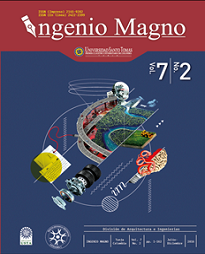Evaluation of recyclable asphalt mixes with additives as an option for reducing economic and environmental impacts
Main Article Content
Abstract
Downloads
Article Details
DECLARATION OF ORGINIALITY OF SUBMITTED ARTICLE
With this document, I/We certify that the article submitted for possible publication in the institutional journal INGENIO MAGNO of the Research Center Alberto Magno CIIAM of the University Santo Tomás, Tunja campus, is entirely of my(our) own writing, and is a product of my(our) direct intellectual contribution to knowledge.
All data and references to completed publications are duly identified with their respective bibliographical entries and in the citations thus highlighted. If any adjustment or correction is needed, I(we) will contact the journal authorities in advance.
Due to that stated above, I(we) declare that the entirety of the submitted material is in accordance with applicable laws regarding intellectual and industrial property, and therefore, I(we) hold myself(ourselves) responsible for any complaint related to it.
If the submitted article is published, I(we) declare that I(we) fully relinquish publishing rights of the article to the University Santo Tomás, Tunja campus. As remuneration for this relinquishment of rights, I(we) declare my(our) agreement to receive two (2) copies of the edition of the journal in which my(our) article appears.
References
Echeverría, J. (2011). Coeficientes estructurales para materiales. En XVIII Simposio Colombiano sobre Ingeniería de Pavimentos. Medellín.
Elizondo, F. y Badilla, G. (2007). Predición de modulos resilientes en mezclas asfálticas mediante el modulo de Witczak. Infraestructura Vial, 10(3).
Higuera, C. H. (2010). Nociones sobre métodos de diseño de estructuras de pavimentos para carreteras (vol. II). Tunja: Universidad Pedagógica y Tecnológica de Colombia.
Instituto Nacional de Vías (Invías) (2013). Especificaciones generales de construcción de carreteras y normas de ensayo para materiales de carreteras. Bogotá: Autor.
Méndez, A. A. (2015). Evaluación ténica y económica del uso de paviemento asfáltico reciclado (RAP) en vías colombianas (tesis de especialización). Bogotá: Universidad Militar Nueva Granada.

